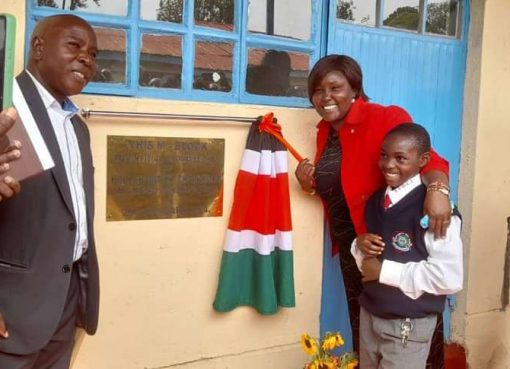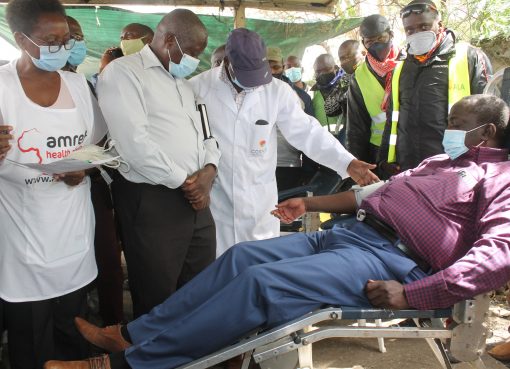

At the crest of Mwashoti Hill inside the sprawling Taita Hills wildlife sanctuary in Mwatate sub-county stands a green-painted, six-foot brick-and-sand monument.
From that vantage point, the undulating brooding Bura ridges and sprawling windswept Tsavo grasslands spread out to the horizon. Far to the West, the blue hazy silhouette of Mt. Kilimanjaro is faintly visible, shimmering faintly as it towers high in the clear skies.
The countryside, green with life and exploding with flowers, carries a haunting beauty that conceals century-old atrocities committed over the idyllic landscape.
As the small group of tourists approaches the cenotaph, a subdued air descends and their lively chatter dies.
Mr. Willy Mwadilo, the General Manager of Taita Sarova Hills and Saltlicks Hotels and the guide for the tourists, stands before the stone monument and touches it, almost reverentially.
“This is the only memory we have of thousands of unknown Africans who died during the World War 1. We hope to honor them in death,” he explains.
He says the commemorative monument in honor of African carrier corps and soldiers who perished between 1914 and 1918 during the First World War is an attempt to ensure the vital role played by Africans in the British-German conflict is not forgotten.
The erection of the monument, an initiative by Sarova Group of Hotels, is being viewed as righting a historical wrong committed upon hundreds of thousands of unnamed African males used as porters, cooks and guards for the British soldiers during the bloody war and whose input remain unacknowledged and uncelebrated.
Western historians of World War One have largely expunged the key role played by Africans from the history of the First World War. Their focus has largely been on the exploits of the white soldiers from both sides of the warring nations while Africans are pushed to the fringes of the battle.
In August 2014, during the commemoration of World War One centenary, James Wilson, the renowned historian and author of Guerrillas of Tsavo, admitted that Africans had been confined to the periphery of history of First World War. He called them ‘the boots and hands’ that won the war.
“Without porters to ferry supplies and weapons for the soldiers at the battle front, that war would never have been won. They were central to the war and should have been recognized,” he said.
It is estimated that over half a million Africans were actively involved in the battle. Half of them died in the war. Mr. Wilson has already started a fundraiser to honor the forgotten dead and has so far raised 200 dollars.
Mwashoti and Maktau areas, in Taita-Taveta, were at the epicenter of troops’ mobilization. Mwashoti Hill was home for a Mashoti Forte, a temporary but impregnable station, where British soldiers fighting at the battlefront in Maktau could get supplies quickly.
The fort was also strategically located with a clear view to Mt. Kilimanjaro where Schutztruppe, German forces in then Tanganyika, were preparing an onslaught of the British army.
Deep trenches, now overgrown with grass, weed and climbing vines can still be seen at the hill, a century after the war. The fort had heavy artillery to repulse the German soldiers.
But even in death, Africans’ role remains unacknowledged. The most visible indicator of this historical oversight is the presence of three officials Commonwealth War Graves in Taveta, Maktau and in Voi. There is not a single African buried in the commonwealth graves.
Taveta cemetery was exclusively for Indians and German soldiers while Maktau was for Indians. Voi Commonwealth War Graves set aside for British soldiers and their allies. Lieutenant William Dartnell, an Australian soldier who was awarded Victorian Cross, the highest military honor, is buried at the Voi Cemetery.
Africans who died either from attacks by wild animals, diseases, hunger or fatigue were abandoned in the thick bush to rot away. It is reported that the 47-km stretch between Voi town and Maktau might be the biggest undocumented graveyard in Africa with tens of thousands of porters who died while carrying supplies and were left in the bush. Mr. Wilson said it was impossible to carry both dead Africans and the supplies at the same time.
The injustice gains national proportion given that porters were ferried to the battle zone from as far as Nyanza and Western Kenya counties. Initially, the Britons conscripted Taita men in Voi and its environs to carry heavy loads, guns and other supplies but they were considered frail and tired quickly.
The use of oxen was unsuccessful due to tsetse fly infestations that killed hundreds of animals. Stronger porters with muscular physiques and who would walk for over 10-km daily with a load of 40-kg strapped on their backs were needed.
As a result, tens of thousands of Luo and Luhya men were ferried to the region using the railway and dropped at Voi town. They would later be divided into groups of 1,500 porters with each group manning a strategic point in the long route to Maktau.
Mr. Mwadilo said the grouping was deemed important for ease of movement. The first 1,500 porters would carry their supplies through the inhospitable Tsavo bush infested with wild animals to Mwatate, where another batch of 1,500 porters would pick up the load to Bura. Another group of porters would pick up the supplies to Mwashoti and later to Maktau where war was raging.
“If one died, his load was shared amongst others and the journey continued,” explained the guide.
As part of immortalizing the Africans’ role during World War One, Sarova Hotels has designed Battlefield Tourism as a specialized package for both local and international tourists. Kenya is known for bush and beach tourism but Mwadilo says the country has a vast potential in battlefield and history tourism to rival South Africa. He revealed that the ancient battle zones still have relics from the war, including rifles, shells, canons, bulwarks and trenches that tell the story of the war.
“This package will include laying a wreath for Africans who perished in that war. They will now become part of the history of World War One,” he said adding that such a move would also allow descendants of the victims of the war to engage the British government over issues of compensation like in the case with Mau Mau.
The main commemorative event is scheduled for 24th and 25th of November, 2018, the day that marked the official end of World War One. Dignitaries from counties involved in the war including Britain, German, India, Australia, Kenya and South Africa among others are expected to attend.
Most important, a wreath to honor thousands of African soldiers, porters and couriers who perished in the war will be laid on the cenotaph. Behind them, the monument stands tall against the blue-sky background; a fitting resting place for restless souls of unnamed thousands dead.
By Wagema Mwangi



